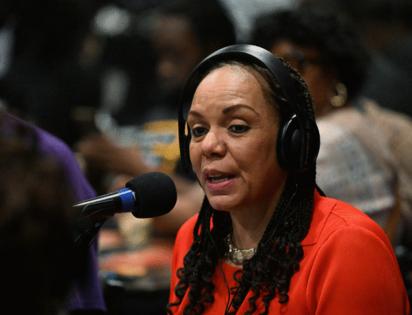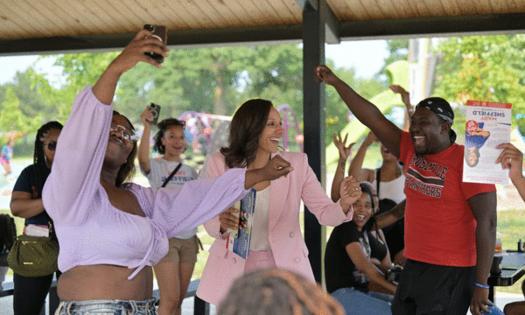Detroit mayoral candidates hit final stretch of campaign before Tuesday primary
Published in News & Features
The nine candidates vying to become Detroit's next mayor hit the final stretch of the campaign on Sunday, doing everything they can to reach voters, from hitting local airwaves and knocking on doors to making phone calls and canvassing neighborhoods.
Tuesday's primary will narrow the number of candidates to two who will go head-to-head in the Nov. 4 general election.
The legacy of three-term Mayor Mike Duggan, who isn't seeking a fourth term as he makes a run for governor as an independent, has cast a large shadow on the race. Most of the candidates have tried to position themselves as the one who can expand Detroit's overall improving fortune — with balanced city budgets, lower crime rates, rising home values and declining poverty rates.
For the candidates who are current elected city officials as well as former Detroit public officials, their pitch has been that they have the experience to keep Detroit on its upward trajectory. Among those candidates are City Council President Mary Sheffield, considered the leading candidate, and Councilman Fred Durhal III, as well as former Detroit Police Chief James Craig and former City Council President Saunteel Jenkins.
All nine candidates participated in a Sunday morning live radio interview by Mildred Gaddis of 105.9 KISS FM. Held at Cutter's Bar & Grill in Eastern Market, it was a rare public forum where all nine candidates showed up, or were invited, to the public event.
"I have 12 years of experience, a record of delivering for this amazing city, of compassion for everyday people," on City Council, said Sheffield, who has been a frontrunner in the race both with polling and fundraising.
She cited her work of reducing red tape for local businesses, creating a "fast track program" that gives preferential treatment to city programs for retired city employees and creating more work for Detroiters.
Sheffield said she'd like to revisit the city's Responsible Contractor Ordinance, which deals with private contractors bidding for city work. Its intent is to reward contractors with track records of training workers, providing safe work environments, and hiring Detroiters, among other things. Sheffield said the ordinance was "watered down" and she intends to amend it so that "we are protecting and supporting the work of unions in Detroit."
Durhal, meanwhile, leaned in on his endorsement by the Detroit Regional Chamber. That's a sign the councilman and former state legislator has a solid overall plan to boost economic development citywide, he said during the Gaddis interview.
Durhal said if he's elected, in his first 100 days in office, he wants to have a "significant drop" in homicides and fatal shootings and talked about his "holistic approach" that will include conflict resolution and more access to mental health.
"We're losing our young people at an exponential rate and so we've really got to get really serious on how we develop good outcomes for them," he said.
A May 27-29 survey of 500 likely primary voters found Sheffield leading the crowded mayoral field with 38%. She had a double-digit advantage over political newcomer the Rev. Solomon Kinloch Jr. at 14%.
Sheffield and Kinloch were followed by Craig at 9% and Jenkins at 8%, according to the commissioned by The Detroit News and WDIV-TV (Channel 4). The survey conducted by the Lansing-based Glengariff Group, which had a margin of error of plus-minus 4.4 percentage points, was a snapshot in time, and voter support may have shifted.
Sheffield also has a substantial fundraising edge. Fundraising reports filed earlier this month show she's raised $807,000 since the start of the year, nearly double that of Kinloch, who raised $409,000, and Jenkins, who raised just over $407,000, according to campaign finance records released by Wayne County.
Candidates make their case
During the radio interview on Sunday, Craig said his experience as police chief, along with his support of President Donald Trump gives him the edge in Tuesday's primary.
"One of the first things I will do as your mayor is launch an independent forensic audit," to determine how city funds are spent, he said.
Jenkins touted her time on council during the city's municipal bankruptcy as well as her work as a CEO with the nonprofit, The Heat and Warmth Fund.
"I was there at the City Council table during the toughest economic times in the city's history," she said. "And for the past 10 years, I've literally been keeping babies warm, making sure that grandmothers weren't sleeping in lazy chairs with no heat. I was making sure that families had water during COVID."
Reaching out to voters
The Sunday morning radio show was just one of the many ways candidates are reaching out to voters. Kinloch wrapped up a series of town hall meetings with voters on Friday.
"This past week, we hit over 1,000 doors face to face," Jenkins said last week. "We called over close to 3,000 voters and we hit as many community events as possible. We'll continue to do that moving forward to Tuesday."
Detroiter Kenneth Clark said Sheffield embodies her campaign slogan, “boots on the ground.”
Clark, 54, invited her to speak to residents of her district, District 5, on Sunday afternoon so they could ask questions of the candidate he hopes is Detroit’s next mayor. She is a natural leader who has played a role in the neighborhood’s turnaround, he said.
“You always hear people say what they’re doing, but I actually see what she’s doing,” he said from the gathering on Bewick Street.
Clark said he first met Sheffield more than a decade ago when she was with a group doing a neighborhood cleanup. He saw she was with the city government, so he told her about a vacant house that needed to be torn down.
Soon, it was torn down.
“When I seen that I said ‘Oh, you’ve got a little power,’” he said. “You’re going to be mayor one day. And here she is, running for mayor.”
Sheffield fielded questions from Kelli McCullough, 49, an undecided voter who was prepared for Sheffield’s visit with questions about what the city can do to incentivize businesses to support their neighborhood, reform the Detroit Land Bank so it’s more responsive to the community and support Detroit students.
Sheffield and her staff took notes on McCullough’s ideas and concerns. Sheffield acknowledged the mayor doesn’t have a direct role over schools, but said she would lobby for better school funding and work to support Detroit children and families so they are ready to learn.
“It’s the needs of a whole self, whole person and family that we have to address,” Sheffield said.
Political newcomers
For political novices and candidates who've run unsuccessfully in the past, they contend they will bring fresh perspectives to the office. Among this group are Kinloch, attorney Todd Perkins, entrepreneur Jonathan Barlow, perennial candidate DaNetta Simpson and retired businessman Joel Haashiim.
"No one likes this narrative of tale of two cities, but it's real," said Kinloch. "They're only projecting 60,000 ... individuals to vote," in the primary. "That means that apathy has set in. Why are Detroiters not engaged? It's because they put up with too many people that talk about what they are going to do and ain't don't none of it."
Perkins contends the last leader in Detroit was Coleman Young, the city’s first Black mayor, who served from 1974 to 1994. The attorney cited public safety, the city's low literacy rate and education levels as things that needed to be immediately addressed.
"People are upset and I hope that anger drives people to vote. Young people don't have hope," he told Gaddis. He also called for a forensic audit of the city government.
“As a lawyer, I know how to unravel problems that the city has. I’m willing to do things that are difficult," he said.
Kinloch, the senior pastor at Detroit-based megachurch Triumph Church, has vowed to create 10,000 new affordable housing units if he's elected and open 10 new grocery stores, among other economic initiatives.
The city anticipates that about 1 in 5 registered voters will cast ballots for the August primary, said Detroit City Clerk Janice Winfrey on Thursday. Turnout for a mayoral primary hasn't broken 20% since 2005, according to a Detroit News analysis. Turnout for Tuesday's primary is expected to be between 13% to 18%, Winfrey said.
©2025 www.detroitnews.com. Visit at detroitnews.com. Distributed by Tribune Content Agency, LLC.










Comments